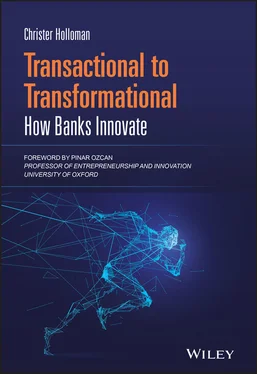In an increasingly competitive fintech venture capital environment, BBVA believed that its increased capital, combined with the traditional venture capital model of Propel, would enable access to invest in the best fintech startups and better support BBVA's vision of using technology to change financial services for the benefit of the customer.
The shift to Propel as an independent entity made it a more attractive investor for the companies BBVA was interested in supporting and also generated more strategic value from this fund.
Losing control of approved investments posed a risk to the bank. The new entity would have substantial autonomy, and it took a lot of trust and alignment in the legal structure and governance to make it possible.
Two important conditions were established as control measures for Propel:
The investment scope was made clear in that the kind of companies in which Propel was going to invest in were companies that were strategically interesting for BBVA, such as those at the intersection of finance and technology. Based on those investment perimeters, Propel was able to freely construct a portfolio of investments and manage the business as any other venture fund.
A quarterly Limited Partner Advisory Council was established to review what investments had been made in the last three months, how the portfolio was doing, updates on the fintech market in general, and other strategic insights brought from the Propel team.
‘Whilst BBVA prefer to invest through Propel, BBVA still retain the option to invest from its balance sheet, e.g. if it is a very large strategic opportunity where they want to take a much bigger ownership stake or doesn't fit the profile of Propel e.g. post Series A.’
Jay Reinemann, General Partner, Propel
In February 2016, Propel was officially launched as a fintech Venture Capital firm with a Small Business Investment Company license. The news was announced by BBVA, which indicated that it had increased its fintech fund to $250 million from $100 million and partnered with Propel Venture Partners to manage the investment independently from its offices in San Francisco. This capital would be invested in two funds, one in the US and the other globally to make investments mainly in Europe and Latin America.
In order to manage this fund, a small team led by Jay Reinemann was spun out of BBVA in San Francisco. The founding team combined executives from BBVA as well as from the startup ecosystem and venture capital and investment banking fields. It was important to have a team that understood the interests of BBVA, had strong fintech knowledge and networks and could build a successful venture fund business.
The team was given authority to form the business to be competitive with the many large established venture fund competitors in Silicon Valley. This traditional venture structure enables the financial alignment to attract great investors to the Propel team and win investments into successful startups.
Propel's focus is on early stage (seed and series A) investment opportunities at the intersection of technology and finance. Areas of focus included payments, lending, insurance, wealth management, digital banking, personal financial management and new digital channels.
The launch of Propel in 2016 was met with a positive industry reaction, if not slight confusion about the difference between Propel and BBVA Ventures, a venture arm wholly owned by BBVA. Multiple outlets, including Bank Innovation, Business Insider, TechCrunch and others, covered the news.
In just four years since the formation of Propel, financial performance has outperformed expectations, with four portfolio companies between the Propel portfolio and BBVA Ventures legacy portfolio that have achieved unicorn status, including two IPO and three exits. The group's portfolio companies have created over 10,000 fintech jobs. The team's portfolio includes over 30 startups of which, in the majority of cases, Propel is a lead investor and Board member. This has led to larger ownership positions and more meaningful roles to help the founders/startups build their businesses.
Looking forward, the expectation for Propel is that it continues to invest in great fintech businesses that provide strategic value and financial returns for BBVA and help the global financial services industry to move forward. Through these investments, BBVA can continue to support the fintech ecosystem, but also learn more about the role technology can play in people's financial lives and how the bank itself can adapt its operating model to deliver on customer's changing expectations.
In terms of strategy, it has been essential for all BBVA areas to have a team located at the centre of the startup ecosystem. Frequent contact with companies and people of interest has provided the bank with a wealth of input for its digital strategy and collaborations between the business areas and the ‘startups’. Propel's creation has also worked for making initial contacts or leveraging certain M&A operations in the digital world carried out directly by BBVA, such as the purchase of Simple in 2014.
Propel has provided BBVA with insights and intelligence on industry trends and external innovation that is relevant to financial services and has had an invaluable contribution helping to drive connections and business opportunities with the Fintech ecosystem. The team played a key role in sourcing new investment opportunities for BBVA. Propel has also helped drive partnership opportunities with startup companies in several countries of the BBVA footprint, such as the US, Spain, Mexico and Colombia. For example, at the end of 2019 BBVA announced a partnership with leading online marketplace lending platform Prosper to offer customers an innovative digital home equity line of credit product.
Four years later, BBVA's ‘venture capital’ model as a sole investor, managed autonomously by Propel to facilitate and expedite investments in ‘fintech’ companies, has become a benchmark for other stakeholders interested in investing in the fintech innovation ecosystem.
‘If I were to do it again, I'd spend more time understanding the venture capital sector, and meeting with partners in venture capital firms across industries. By doing so, we would have better understood the world of fintechs, venture capital and funding, which may have helped us understand how to set up a firm that would be immediately well received in those circles.’
Javier Rodríguez Soler, CEO, BBVA USA
Propel was created from BBVA Ventures to solve for the dual problems of flexibility in the amount of investment and the challenge around being tied to a corporate investment arm, and the perceived lack of independence in that. Of course, hindsight is 20/20 and launching as an SBIC initially would have been the best course of action.
This leads into one of the most surprising elements of venture capital funding, which is that fintechs and venture capital funds run in a tight circle. The setup, as they had with BBVA Ventures, was outside of that circle, given its direct tie to BBVA. As a result, they missed out on some funding opportunities in which they might have otherwise engaged.
Managing partner for Propel, Jay Reinemann, also made it clear that it is not just about funding fintechs. For as brilliant as fintech founders may be, Jay says it is critical that we remember these companies are startups, and as such money is just one thing they need, the other being support and understanding when it comes to running a company. Not only can the partners at Propel provide that, but, as their strategic partner, BBVA is well‐situated to be a key element of their success through the resources they can provide.
Читать дальше











